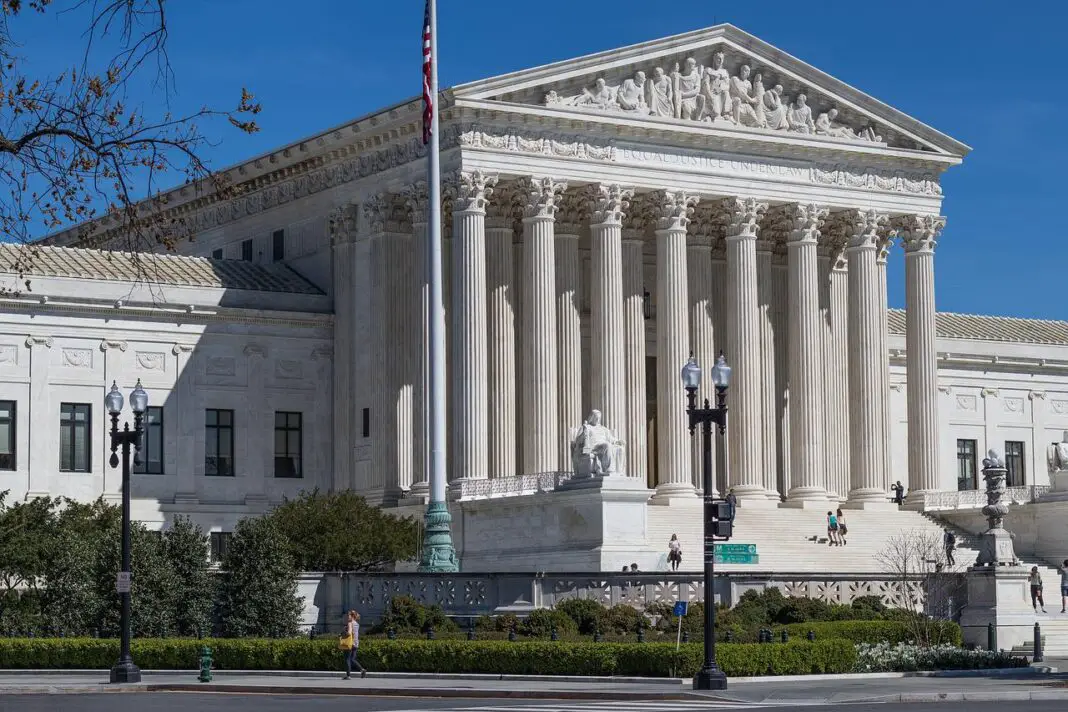The Supreme Court heard arguments on Thursday, May 15, regarding birthright citizenship and the authority of lower courts to issue nationwide injunctions against executive actions. Justice Elena Kagan offered critical remarks about the Trump administration’s legal stance.
During over two hours of oral arguments, Kagan intensely questioned U.S. Solicitor General D. John Sauer concerning the administration’s challenge to lower courts’ ability to block President Donald Trump’s executive order on birthright citizenship through nationwide injunctions.
“If I were in your shoes, there’s no way I’d approach the court with this case!” Kagan remarked during a moment that highlighted the proceedings’ intensity.
Sauer attempted to discuss legal tools available for similar situations, but Kagan interrupted to underscore the real-world implications. “This is not a hypothetical — this is happening out there. Every court is ruling against you,” she noted, referring to the administration’s repeated losses in lower courts on the issue of birthright citizenship.
The case focuses on three lower courts that issued national injunctions earlier this year, blocking President Trump’s executive order signed on January 20, 2025. The order seeks to reinterpret the 14th Amendment to deny automatic U.S. citizenship to children born in the United States if their mother is unlawfully present or temporarily in the country, and if their father is neither a U.S. citizen nor a lawful permanent resident at the time of birth.
Sauer, representing the administration, argued that nationwide injunctions are a form of judicial overreach and that lower courts should only block the order for the specific plaintiffs who filed lawsuits. He contended that such universal injunctions have “exploded” in use since 2007 and constitute a “pathology” within the legal system.
The court’s liberal justices were skeptical of the administration’s position. Justice Sonia Sotomayor posed a hypothetical about presidential overreach: “If a new president decided to seize all guns in the country, would we in the courts have to sit back and wait until every plaintiff whose gun is taken comes into court?”
Justice Ketanji Brown Jackson described the administration’s argument as creating a “catch me if you can kind of regime” that would necessitate each affected individual to file a separate lawsuit.
Conservative justices, including Justice Amy Coney Barrett, also posed challenging questions to Sauer. Barrett questioned the government’s reluctance to engage with the substantive constitutional issue about birthright citizenship and later inquired whether the administration believes it must adhere to all federal court decisions.
When Sauer disclosed that the Trump administration does not universally follow lower court precedents, Barrett expressed concern, asking, “Did I understand you correctly to tell Justice Kagan that the government wanted to reserve its right to maybe not follow a … circuit court precedent, say, in New York, because you might disagree with the opinion?”
The case has significant implications beyond birthright citizenship, potentially setting a precedent affecting numerous federal lawsuits challenging White House actions since Trump started his second term. According to a Fox News analysis, over 310 such lawsuits have been filed since January 20.
While the procedural issue of nationwide injunctions dominated discussions, the court occasionally addressed the substantive topic of birthright citizenship. Sauer argued that the 14th Amendment, which guarantees birthright citizenship, was intended for freed slaves, not immigrants to the United States.
Justice Sotomayor disagreed, noting that Trump’s order could render thousands of newborns “stateless” – without citizenship in the U.S. and potentially not recognized by their parents’ countries of origin. She emphasized that many lower courts found the order violates “not only precedent but the plain meaning of the 14th Amendment.”
New Jersey Solicitor General Jeremy Feigenbaum, representing the states challenging the order, warned of “unprecedented chaos on the ground” if nationwide injunctions were abolished. He urged the justices to consider the impracticality of recognizing birthright citizenship in some states but not others.
Feigenbaum, who has previously argued successfully before the Supreme Court, acknowledged concerns about district courts impacting nationwide policy and agreed that nationwide injunctions should be used sparingly, suggesting that the Court could help define when such injunctions are appropriate.
Kelsi Corkran, representing individual families and immigrant advocacy groups, opposed Justice Kavanaugh’s suggestion that class-action lawsuits could replace nationwide injunctions. She argued that this approach would require vulnerable immigrants to identify themselves to the government, exposing them “to great risk of adverse consequences, detention or deportation.”
The stakes are particularly high for immigrant families affected by the executive order. More than 150,000 newborns would be denied citizenship annually if Trump’s order is implemented, according to plaintiffs challenging the directive.
Outside the Supreme Court building, hundreds of protesters gathered to oppose Trump’s birthright citizenship order. Some chanted pro-immigrant slogans, while Representative Nancy Pelosi, standing on the court’s steps, read the text of the 14th Amendment to applause from the crowd.
The justices appeared divided on how to resolve the complex case. Chief Justice John Roberts noted potential benefits to allowing appeals courts sufficient time to rule on the merits before cases reach the Supreme Court. Justice Clarence Thomas remarked, “We survived until the 1960s without universal injunctions,” suggesting the legal system could function without them.
Justice Kavanaugh, appointed by Trump during his first term, sought a middle ground by exploring whether class-action lawsuits could offer the same practical benefits as nationwide injunctions while addressing concerns about judicial overreach.
A decision in this high-profile case is expected by early summer, potentially reshaping both the immediate question of birthright citizenship and the broader relationship between the judiciary and executive branch during Trump’s second term.











